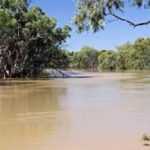Guess who got a cattle station for Christmas
The Australian government has recently approved a bid from mining magnate Gina Rinehart and a Chinese partner to buy the cattle empire S. Kidman & Co. Max Thomas voices his concerns.
In September 2016, the Sydney Morning Herald (SMH) reported that the then acting Prime Minister Barnaby Joyce had been grilled over his history of donations from mining magnate Gina Rinehart. The ABC 7.30 program’s Leigh Sales asked Joyce what he would be expected to provide in return for the $50,000 donated by Mrs Rinehart to his 2013 election campaign. “I haven’t given, to be honest, Ms Rinehart or Hancock coal or anything…” Joyce means Hancock Prospecting, which is owned and chaired by Rinehart. Joyce concluded: “They support the conservative side of politics. They’re Australian. It goes via a political party so it’s arm’s length to me … I’ve been fighting against the unrestricted movement of mines onto farmland for as long as we’ve been talking to one another. That’s never changed.”
Mr Joyce’s seat of New England has been a focal point of the ongoing struggle between mining interests and those opposed to coal seam gas extraction. When his government approved the $1 billion Shenhua mine last year in his electorate, Mr Joyce said it was ridiculous that you would have a major mine in the midst of Australia’s best agricultural land. So what’s this all about?
Gina Rinehart’s eldest son John Hancock has criticised Joyce for his involvement in a dispute over a multi-billion-dollar family trust. He told Radio National Breakfast Joyce had sent John’s youngest sister Hope an email trying to convince her not to proceed. “Coming from his government email I just think it’s extraordinary, and this character sits three chairs down from our Prime Minister”.
In May 2015, the New South Wales Supreme Court ordered that Gina Rinehart’s second daughter Bianca be appointed trustee of the funds, then worth more than $4 billion. In handing down his decision, Justice Brereton said it had become clear throughout the proceedings Mrs Rinehart had ‘gone to extraordinary lengths’ to maintain control of the trust, directly and indirectly.
According to the SMH, Mrs Rinehart paid for Joyce and Liberal deputy leader Julie Bishop to fly to a lavish family wedding in India in 2011. Gina has social aspirations, seeming unaware that the exchange rate between the old money and the new is not negotiable. But she’ll be sure to put on a big BBQ bash or one of those dreadful ‘musters’ to celebrate buying the Kidman place with Shanghai CRED Real Estate. Barnaby’s invitation no doubt came with Gina’s Christmas card.
Hancock Prospecting reportedly intends to increase the cattle stocking rate on the Kidman properties over the next year or two. They must have a better long-term weather forecast than the rest of us. They must also have good intelligence on the health of the rangeland vegetation. Joel Fitzgibbon should be keeping an eye on the approval to be issued by Treasurer Scott Morrison. Barnaby will of course have to remain at arm’s length to avoid any perception of a conflict of interest.
Along with the amazing improvements in weather forecasting, remote sensing and satellite imagery, there are parallel advances in agronomics. Constant real-time surveys of cropping developments and critical trends in mapping rainfall, soil moisture, fuel supplies, transport, global markets and technology enable very sophisticated analysis and data extrapolation to support investment decisions. For those closer to the ground doing the hard graft; here remains an element of risk. The big money is in futures.
Some climate change zealots, basing their faith on dogma, loudly proclaim that we are all doomed because there will be less rain. That’s like screaming that there are too many cars on the freeway – it doesn’t help solve the problem. It is the more subtle changes in seasonal rainfall distribution that are so difficult to predict which are likely to create dangerous instability in food security.
Goyder’s Line was drawn by South Australia’s Surveyor General in 1865. It runs roughly east-west across South Australia and joins places with an average annual rainfall of 250 mm. Rainfall is too low and unreliable for agriculture north of this line. Farmers are adjusting to the southward creep of Goyder’s line with less rainfall expected in the future and also changes in the seasons. The lonely, abandoned farms north of the line testify to unfounded optimism, heroic labour and disappointment in the 19th century. Now there is no excuse for overlooking the limits of land capability by overstocking or cropping increasingly marginal land.
If producers attempted to meet a sharp increase in demand without regard for our highly variable seasonal conditions, the disastrous US ‘dustbowl’ experience of the dirty-thirties could be repeated in Australia. Grain prices fell disastrously in the USA during the great depression; croppers responded by cultivating and planting much more land in the hope that by producing more they could survive. But nobody could afford to buy and many had to walk off the land leaving it to the elements. The Oklahoma and Texas panhandles and the neighbouring region has little rainfall, but there was a severe drought in the early thirties. The loose topsoil was easily picked up by the high winds into dense clouds of dust, called black blizzards. We saw something like that in the Melbourne dust storm of 1983.
There has been a school of thought that climate change might produce more reliable rainfall in parts of remote Australia. Could it be that the smart money is betting on parts of Australia returning to the wetter climate that prevailed eons ago when the minerals we now extract were deposited? Irony is an apt word to use when discussing anything to do with Hancock Prospecting. It is especially ironic that a government, which has repudiated climate science, could indirectly or unwittingly rely on this school of thought to permit a huge expansion of the cattle herd in parts of the country that require expert scientific management to avoid severe and widespread desertification.
A rapid cattle herd expansion for export would be likely to place upward pressure on domestic beef prices. So if, like Barnaby, you enjoy a steak on the BBQ, you had better make the most of the next couple of years, because it won’t be just the fire ants stinging in the hip pocket region. In China people generally don’t care much for lamb and perhaps we could hope it stays that way.
Back to Gina’s BBQ, where I almost wouldn’t mind being a blowfly on the dunny wall. Parliaments are for show, the real decisions are made elsewhere. What plans for the future of Australia might be hatched in Gina’s new outback backyard? Do the powerful think democracy is just another brand bought with a vote and consumed like something picked up at the checkout? Political capital is accumulated by issuing a false prospectus to attract votes best described as units of equity in the corporate state. ‘Managerialism’ is about to become the ruling paradigm for implementing the agenda with Trump its self-appointed world champion, guided by his manifesto The Art of the Deal [1987].
The reactionary sentiment driving the mindless drift to populism is deplorable. Why would the ‘leader of the forgotten’ masquerade as a clown, unless he didn’t want to be taken seriously until it was too late?
An edited version of this article first appeared here.

Max Thomas, Dip. Agric. (retired) worked in the public sector and in private consulting on a range of land, water and waste management projects. He prepared guidelines for irrigation with recycled water for EPA Victoria and developed a number of Environmental Management Systems in the water industry.















